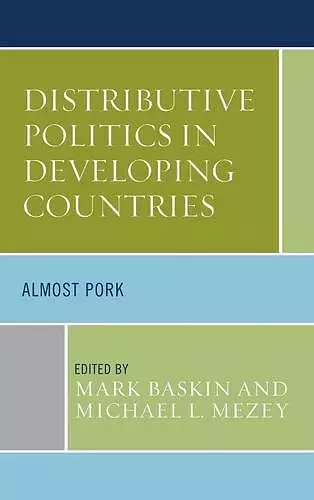Distributive Politics in Developing Countries
Almost Pork
Michael L Mezey editor Mark Baskin editor
Format:Hardback
Publisher:Lexington Books
Published:23rd Oct '14
Currently unavailable, and unfortunately no date known when it will be back

This book explores the increasing use of Constituency Development Funds (CDFs) in emerging democratic governments in Africa, Asia, the Caribbean, and Oceania. CDFs dedicate public money to benefit parliamentary constituencies through allocations and/or spending decisions influenced by Members of Parliament (MPs). The contributors employ the term CDF as a generic term although such funds have a different names, such as electoral development funds (Papua New Guinea), constituency development catalyst funds (Tanzania), or Member of Parliament Local Area Development Fund (India), etc. In some ways, the funds resemble the ad hoc pork barrel policy-making employed in the U.S. Congress for the past 200 years. However, unlike earmarks, CDFs generally become institutionalized in the government’s annual budget and are distributed according to different criteria in each country. They enable MPs to influence programs in their constituencies that finance education, and build bridges, roads, community centers, clinics and schools. In this sense, a CDF is a politicized form of spending that can help fill in the important gaps in government services in constituencies that have not been addressed in the government’s larger, comprehensive policy programs. This first comprehensive treatment of CDFs in the academic and development literatures emerges from a project at the State University of New York Center for International Development. This project has explored CDFs in 19 countries and has developed indicators on their emergence, operations, and oversight. The contributors provide detailed case studies of the emergence and operations of CDFs in Kenya, Uganda, Jamaica, and India, as well as an analysis of earmarks in the U.S. Congress, and a broader analysis of the emergence of the funds in Africa. They cover the emergence, institutionalization, and accountability of these funds; analyze key issues in their operations; and offer provisional conclusions of what the emergence and operations of these funds say about the democratization of politics in developing countries and current approaches to international support for democratic governance in developing countries.
This insight into Constituency Development Funds—their nature and effects, potential benefits and risks, and the importance of national context from least developed to USA’s earmarking—provides a resource that will be valued by a wide range of readers. The expertise of Baskin, Mezey, and their contributors shines through in an excellent introductory overview, a series on well-researched case studies, and a useful concluding review that includes theoretical context. Policy-makers, legislators, development partners and public administration practitioners, and scholars will find this a valuable aid to understanding the diversity of CDF practices. -- Ken Coghill, Monash University
This pioneering, comparative study of the role of constituency development funds in the developing democracies explores the reasons for their recent proliferation, the variety of institutional forms they take, the objectives they are designed to serve, and their consistency and inconsistency with democratic governance. The authors are the leading scholars in this field and the case-study chapters reflect both their country-specific expertise and their collaboration in meetings, conferences, and joint projects. Their findings challenge many conventional beliefs about these funds, showing what they do and do not accomplish, and lead to valuable generalizations that are summarized in an excellent introductory and concluding chapter. -- Gerhard Loewenberg, University of Iowa
Over the past decade or so, Constituency Development Funds (CDFs) have emerged as an important legislative development policy tool and have been established, or are planned, in more than two dozen countries. With their increasing adoption has come a heated debate on the efficacy of such Funds. Advocates—mostly Members of Parliament (MPs) and a small but growing number of legislative strengthening practitioners—advocate such Funds as a means to connect MPs to their constituents and as small, yet significant, instruments of development. Critics, mostly from non-governmental organizations and some donor agencies, argue that the funds are little more than ‘re-election slush funds’ for incumbents and are prone to corruption. What is remarkable is that, until now, there has been no serious study of CDFs. Professor Mark Baskin, the guru on CDFs, along with Professor Michael L. Mezey, have assembled a prominent team of academic and practitioner experts to review CDFs in order to, in their words, ‘to reduce the heat to light ration’ in the current debates. This volume does exactly that—it examines CDFs and presents the good, the bad, and the ugly. It should be required reading for anyone wishing to learn about, or to make an informed judgement on, CDFs. -- Frederick Stapenhurst, McGill University
ISBN: 9780739180686
Dimensions: 236mm x 161mm x 26mm
Weight: 540g
278 pages